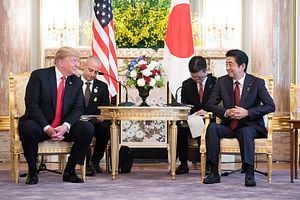The world’s first and third largest economies issued a joint statement in New York last week finally closing five months of negotiations with a “mini” trade deal aimed at easing trade tensions between the two allies.
The trade pact focuses on reduced tariffs on agricultural products and digital trade while leaving auto tariffs for later discussion.
On Monday, Japanese Foreign Minister Toshimitsu Motegi, who led the negotiations, announced all trade talks had wrapped up with both sides reaching “final agreement.” He stressed it is a “win-win” agreement which benefits the people of both countries. U.S. President Donald Trump hailed it as a “phenomenal” victory for American farmers.
The new trade pact is reported to slash Japan’s tariffs on $7 billion worth of American agricultural products. The United States pulled out of the Trans-Pacific Partnership Agreement (TPP) almost three years ago. Under the new mini deal, U.S. pork and beef producers will get a reduced tariff rate of 9 percent — the same level of access to signatories of the TPP. Meanwhile, Japan agreed to immediately eliminate tariffs on cheese, wine, wheat, almonds, blueberries, cranberries, walnuts, corn, broccoli, and prunes with an import value of $1.3 billion annually.
On Tuesday, Japanese Prime Minister Shinzo Abe told reporters that Japan’s national interests were still protected with rice — a mainstay of Japanese cuisine and farming — shielded from tariff cuts. In addition, dairy products such as evaporated milk and butter will not gain improved access to Japanese consumers.
In light of growing fears among Japanese farmers, Abe and his cabinet vowed to formulate measures to boost the international competitiveness of Japanese agricultural products in both Japan and abroad by the end of the year.
During the House of Representatives Budget Committee meeting, the National Democratic Party described the trade pact as the sacrificing of the agricultural industry in exchange for shaking off Trump’s threat of launching additional tariffs of up to 25 percent on Japanese vehicle imports.
The biggest task for Japan was to secure a U.S. guarantee on bypassing auto tariffs threatened as a way to make up for a chronic trade deficit in which largely, 80 percent, stems from Japan’s export of cars and auto parts.
However, critics have questioned just how Japan could end up with an “equal” agreement when Japanese negotiators could not secure concrete terms on eliminating tariffs on Japanese cars. Over the five months of negotiations, Japan backed down on plans to retaliate with additional tariffs on U.S. auto exports based on pressure from the U.S that it would go against the goal of reducing a trade deficit with Japan.
Japanese farmers have voiced concerns on a host of cheaper products from overseas flooding the domestic market with the TPP giving preferential access to Japanese market to competitors such as Australia, Canada and New Zealand in the 11 nation deal negotiated under the Obama administration.
President Trump’s trade war with China has seen U.S. agricultural trade at its lowest surplus in over a decade. In the first eight months of this year, exports declined 4 percent compared to last years data as Brazil, China and Russia sit among the countries taking advantage of the new market share. Farmers have welcomed the agreement calling it a “step in the right direction” in the chance to restore equal footing with international rivals.
Although it’s widely reported a “final agreement” has been reached and anticipated to come into effect from January 1 next year, the final written agreement still needs to be finalized. The focus will shift now from negotiations to talks on gaining approval in the Diet in late October, not to mention drafting legal checks by the Cabinet Legislation Bureau.
Japan is expected to pressure the U.S. for assurances that Trump will not impose auto tariffs, but it is unsure whether Washington is willing to compromise. At this stage there is no timetable set for future trade talks.

































